![]() EPS YM Vilnius contributed to the organization of “Sunrise Valley Semiconductor Seminars” and “Joint Theoretical Physics Seminars”, which are among the largest recurrent seminars within Center for Physical Sciences and Technology (CPST) for over a year.
EPS YM Vilnius contributed to the organization of “Sunrise Valley Semiconductor Seminars” and “Joint Theoretical Physics Seminars”, which are among the largest recurrent seminars within Center for Physical Sciences and Technology (CPST) for over a year.
Seminar series covered topics like fundamental and solid-state physics issues, practical and physical aspects of semiconductor industry and technologies (f. e.: nitride laser diodes – prospects and problems, diamond quantum science and technology, ultra-fast lasers and 4D printing, studies of interfacial defects in crystals, etc.).
“Sunrise Valley Semiconductor Seminars” and “Joint Theoretical Physics Seminars” provided a platform for scientists and entrepreneurs to discuss, exchange and share their experience. It is the best example of R&D element when industrial representatives and entrepreneurs get stronger scientific background, and scientists in exchange get a chance to know the challenges of marketing innovations, ideas, etc.
Seminar initiators are well known scientists dr. A. Alkauskas (Principal Research Fellow at CPST), dr. A. Vizbaras, and dr. K. Vizbaras from “Brolis Semiconductors” (high-technology company that has clients from over 160 companies throughout the world from Japan to the United States of America) and EPS YM in Vilnius president – M. Mackoit.
Seminars gather scientists from Faculty of Physics (Vilnius University), Institute of Theoretical Physics and Astronomy, Vilnius University Institute of Applied Researc and CPST, industry etc.
EPS YM made these seminars attractive not only to experienced scientists from various theoretical physics research institutions, but for MSc and PhD students as well. Leading researchers from universities, institutes and companies of United States of America, Australia and Europe were invited to give a talk at “ Sunrise Valley Semiconductor Seminars”. Frequency of these workshops was twice a month. EPS YM in Vilnius is spreading information about the seminars by popularizing it through the posters and fliers (advertising the seminars in the faculty, CPST departments, laboratories, etc.), facebook (Physics Seminars in Saulėtekis), twitter (Physics in Lithuania). EPS YM is helping in organizing the coffee breaks, carrying out speaker lists, preparing little souvenirs for speakers to remember their visit in Lithuania, etc. EPS YM members were even moderating these seminars. These workshops have a huge potential for interdisciplinary research and collaboration between physicists and entrepreneurs. Center for Physical Sciences and Technology wants them to continue in 2017/2018. In October we’re going to invite Prof. Dr. Fedor Jelezko (Institute for Quantum Optics and Department of Physics, Ulm University, Germany) to give a talk about quantum information processing with spins in diamond.
Open Readings 2017
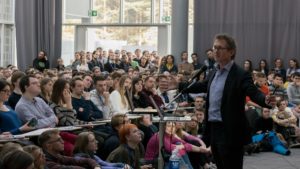 60th International Conference for Students of Physics and Natural Sciences “Open Readings 2017” – international academic platform for students, scientists and researchers from all over the world to present their ongoing research results and best practices in fields of Physics and Natural Sciences. “Open Readings 2017” goal was to enable the interactive exchange of knowledge. The conference also served to foster communication among researchers working in a wide variety of scientific areas. This conference gave an opportunity for BSc, MSc, PhD, who are doing their scientific research, to present it to a larger audience, get constructive criticism and useful advice. It was one of the best opportunities for Physicists from Europe, and not only, to disseminate their scientific achievements.
60th International Conference for Students of Physics and Natural Sciences “Open Readings 2017” – international academic platform for students, scientists and researchers from all over the world to present their ongoing research results and best practices in fields of Physics and Natural Sciences. “Open Readings 2017” goal was to enable the interactive exchange of knowledge. The conference also served to foster communication among researchers working in a wide variety of scientific areas. This conference gave an opportunity for BSc, MSc, PhD, who are doing their scientific research, to present it to a larger audience, get constructive criticism and useful advice. It was one of the best opportunities for Physicists from Europe, and not only, to disseminate their scientific achievements.
“Open Readings 2017” took place from March 14-17th, in the largest scientific research institution in Lithuania Center for Physical Sciences and Technology. This year this conference gathered above 350 presenters from more than 20 different countries and 9 invited incredible lecturers from the World’s Top Scientists: Bernard Lucas “Ben” Feringa – laureate of 2016 Nobel Prize in Chemistry; Jonathan Richard Ellis – one of the most respected scientists in modern-day physics with research interest in particle physics; Philip Russell – world renowned physicist, Director at the Max-Planck Institute for the Science of Light; Michael Grätzel – one of the most renowned material scientists worldwide, who recently received the Millennium Technology Award; Robin Lovell-Badge – Head of the Laboratory of Stem Cell Biology and Developmental Genetics at the Francis Crick Institute; Xi-Cheng Zhang – a Chinese-American Physicist, THz and ultrafast optics specialist; Naomi J. Halas – pioneering nanotechnologist at Rice University, co-founder of Nanospectra Biosciences; Eugenio Coccia – director of the Gran Sasso Science Institute and professor of Physics at the University of Rome Tor Vergata.
OSA and SPIE Student Chapters of Vilnius University played a huge role in the funding of this conference.
European Physical Society Young Minds Section of Vilnius University (EPS YM Vilnius) also has contributed to organization of this conference. EPS YM together with VTeX organized workshop: “What’s hot in the science publishing: the scientists’ approach”, members of EPS YM Vilnius has witten two OR17 popularizing articles.
During the conference EPS together with “Olympus of Physics” organized “10th Lithuanian Π day championship” at Faculty of Physics. We gathered ~100 (students, University workers, managers, etc). This year Lithuania Guinness record was broken – Henrikas Šalūga memorized 5001 decimal places of Pi – this was posted in the social media (http://www.delfi.lt/mokslas/mokslas/naujas-lietuvos-rekordas-net-5001-skaitmuo-is-atminties.d?id=74066314 ) . EPS bought awards for the winners (bluetooth headphones, cups-pins-pens with logo and Π,”Olympus of Physics” – cash prizes. EPS invited special guest from Mathematics and Informatics faculty (Vilnius University) dr. G. Alkauskas, who conducted a lecture: “Periods – transcendental numbers that are arithmetic”.
EPS YM in Vilnius reimbursed the travel expenses for Jonathan Richard Ellis. It payed even more attention to our section and attracted new members. Photos: http://www.openreadings.eu/archive/.
Strathclyde’s Physics Journal Club
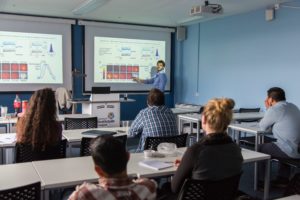 From late 2016 to the first half of 2017, SCOPE has continued organising the Strathclyde’s Physics Journal Club fortnightly with excellent participation and support from the students involved.
From late 2016 to the first half of 2017, SCOPE has continued organising the Strathclyde’s Physics Journal Club fortnightly with excellent participation and support from the students involved.
Keeping the spirit from the previous year, the aim of this activity was to both give the chapter members the opportunity to present some of the relevant papers in their field, or more broadly in general interest science, and also enhance the communication with other students, learning and talking about physics in a relaxed atmosphere. We aimed to develop a vital skill for young researchers: the ability to efficiently analyse and present a high-profile scientific paper. As many of the students were lacking this kind of activities in their own groups, we provided this student-run platform with great success.
Throughout the year, we tried to broaden the topics covered in the sessions ranging from plasma physics to biological lasers. At the same time, we focus a lot of our efforts in incorporating new people to the Journal Club. This lead to a nice attendance in all the sessions and benefitted other of our events as people got to know SCOPE through the Journal Club. We encouraged all our attendees to present at least once and thanks to that we managed to cover really diverse areas of physics. The presentations were usually 20 to 30 minutes long, supported by whiteboard sketches and slides, and it was followed by an informal discussion with some refreshments.
The rest of the students provided some feedback after the presentation helping the speakers improve their weaker points and together improving the understanding of the topic being discussed. To make this discussion as useful as possible, all the attendees had access to the presented papers a few days in advance to be able to familiarise themselves with the subject.
The success of the activity was also due to the fact that the activity was run by other students, reducing the anxiety of making mistakes or asking questions, and generating a suitable environment for group learning.
We are certain that this activity will remain valued by the students in the coming years. That’s why we are planning on maintaining it in the next academic year. As the activity requires a small budget we will be able to organise it without requiring further funding.
Light Talks
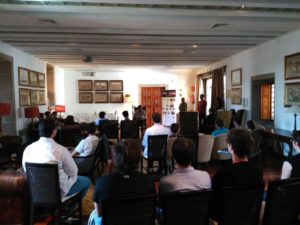 As we have written down in our Grant request form, we want to perform a scientific coffee with some of the former members of the student chapter. However, the performance of the OPTOEL congress in our city gives us the possibility to take advantage of this and perform a more impact activity. Therefore we have organized a scientific coffee during the congress. This event was performed in the afternoon of the 13th of July in the same place as the OPTOEL and it was devoted to the students that attended to the congress. In this scientific coffee, two international recognized researchers form different areas share their experiences in the science career with the attendees. We counted with Dr. Xingde Li, whose research is focused in biomedical image, and with Dr. Olivier Chalus, expert in high power lasers and Project Manager R&D Scientist at Thales Optronique SA. In this event, the participants had the opportunity to ask the researchers about their experiences and opinions and to interact with them in a closest way that in other congress event will not be possible. As Section, we believe that this activity was very satisfactory for both the attendees and the members of the section, since as group we have improve our organization skills by participating in the organization of this event in parallel with the Optoelectronics Congress. We strongly believe that take advantage of the OPTOEL congress was the best decision to make a scientific coffee with high impact that usually a small city like ours is not able to perform. However we are planning to perform in next months the scientific coffee with former members. We believe that this is also an important event for grade students who are still thinking about their future after the University studies.
As we have written down in our Grant request form, we want to perform a scientific coffee with some of the former members of the student chapter. However, the performance of the OPTOEL congress in our city gives us the possibility to take advantage of this and perform a more impact activity. Therefore we have organized a scientific coffee during the congress. This event was performed in the afternoon of the 13th of July in the same place as the OPTOEL and it was devoted to the students that attended to the congress. In this scientific coffee, two international recognized researchers form different areas share their experiences in the science career with the attendees. We counted with Dr. Xingde Li, whose research is focused in biomedical image, and with Dr. Olivier Chalus, expert in high power lasers and Project Manager R&D Scientist at Thales Optronique SA. In this event, the participants had the opportunity to ask the researchers about their experiences and opinions and to interact with them in a closest way that in other congress event will not be possible. As Section, we believe that this activity was very satisfactory for both the attendees and the members of the section, since as group we have improve our organization skills by participating in the organization of this event in parallel with the Optoelectronics Congress. We strongly believe that take advantage of the OPTOEL congress was the best decision to make a scientific coffee with high impact that usually a small city like ours is not able to perform. However we are planning to perform in next months the scientific coffee with former members. We believe that this is also an important event for grade students who are still thinking about their future after the University studies.
Spreading Optics in the School
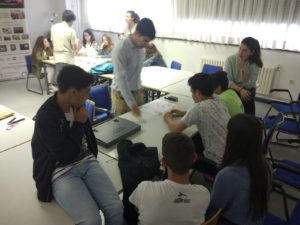 One more year, the USC Young Minds Section is devoted to outreach activities in several topics of Optics for children of different ages, from five to eighteen years old. In particular, in this academic course we have performed two activities with schools, one for children from primary level and another with kids from secondary. The experiences performed during these events were the same in both cases but adapted to their level of knowledge and age. Briefly, each member of the YM Section performs one Optics experience to a reduced group of 10-15 children in order to have a more personalized attention. These activities are: 1) the functioning of the eye, where ametropies such as myopia or hyperopia are explained as well as how the human eye works by using different lenses. 2) Light-mater interaction, where concepts like fluorescence are shown by using laser pointers and olive oil or white paper. 3) Polarization, where this phenomena is explained in asimple way and some of its applications, like cinema glasses, are shown. 4) Light propagation, where concepts like reflection, refraction and transmission are explained as well as some fiber optics applications in their daily life are shown. This activity has had a very good reception among teachers and children. Since we have performed this Optics experiences from some years, we count with the contact of some schools that are interested in our activities year on year, making more easy to organize this event and to combine it with the duties of the member of the Young Minds Section.
One more year, the USC Young Minds Section is devoted to outreach activities in several topics of Optics for children of different ages, from five to eighteen years old. In particular, in this academic course we have performed two activities with schools, one for children from primary level and another with kids from secondary. The experiences performed during these events were the same in both cases but adapted to their level of knowledge and age. Briefly, each member of the YM Section performs one Optics experience to a reduced group of 10-15 children in order to have a more personalized attention. These activities are: 1) the functioning of the eye, where ametropies such as myopia or hyperopia are explained as well as how the human eye works by using different lenses. 2) Light-mater interaction, where concepts like fluorescence are shown by using laser pointers and olive oil or white paper. 3) Polarization, where this phenomena is explained in asimple way and some of its applications, like cinema glasses, are shown. 4) Light propagation, where concepts like reflection, refraction and transmission are explained as well as some fiber optics applications in their daily life are shown. This activity has had a very good reception among teachers and children. Since we have performed this Optics experiences from some years, we count with the contact of some schools that are interested in our activities year on year, making more easy to organize this event and to combine it with the duties of the member of the Young Minds Section.
OPTOEL2017
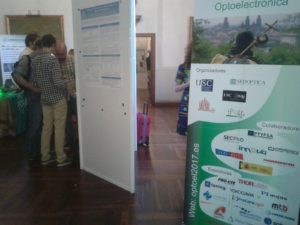 This year the OPTOEL congress (Spanish Congress of Optoelectronic) was held in Santiago de Compostela from the 12th to the 14th of July. It was organized by our University (Universidade de Santiago de Compostela) and, in particular, by the Photonics4Life research group where most of the members of the Young Minds Section are doing their PhD studies. The members of the Section were actively participating in the organization of the congress and with the help of the funding received with the grant “EPSYM2017A32-200€”. The money of the grant was used to print some advertisement of the chapter and with a contribution into the congress. Moreover we became officially part of the organizators of the congress with our economical contribution plus the work of the YM Section. We made a special effort in getting involved the youngest members of the group, so we introduce them in the leading role of managing a congress and giving support to the main organizers.
This year the OPTOEL congress (Spanish Congress of Optoelectronic) was held in Santiago de Compostela from the 12th to the 14th of July. It was organized by our University (Universidade de Santiago de Compostela) and, in particular, by the Photonics4Life research group where most of the members of the Young Minds Section are doing their PhD studies. The members of the Section were actively participating in the organization of the congress and with the help of the funding received with the grant “EPSYM2017A32-200€”. The money of the grant was used to print some advertisement of the chapter and with a contribution into the congress. Moreover we became officially part of the organizators of the congress with our economical contribution plus the work of the YM Section. We made a special effort in getting involved the youngest members of the group, so we introduce them in the leading role of managing a congress and giving support to the main organizers.
Specifically the YM Section was in charge of the reception and check-in of all the investigators plus giving any advice about the city. Finally we also participate in the congress giving some technical support like printing information panels or preparing the attendees’ gift.
As a section we believe that taking part of the organization of the OPTOEL 2017 allow us to improve key features in our following careers. We were able to improve our networking with some colleagues from other sections and to give more visibility to this kind of young students group.
Let’s make room for science
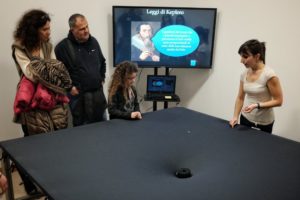 The year 2016 has brought one of the most awaited and important discoveries of modern physics of all times: the first observation of gravitational waves. This event, confirming once again the Einstein’s theory of General Relativity, has given rise to a renewed interest of the general public toward the fascinating topic of gravity. It is in this spirit that the EPS Young Mind section of Rome has organized a whole new project called “Let’s make room for science!”, regarding the three topics of gravity, light and energy. The project, partially founded by 2017 Activity Grant, consisted in creating at the Physics Department of the University of Roma Tre three rooms of exhibits and experiments dedicated to each topic.
The year 2016 has brought one of the most awaited and important discoveries of modern physics of all times: the first observation of gravitational waves. This event, confirming once again the Einstein’s theory of General Relativity, has given rise to a renewed interest of the general public toward the fascinating topic of gravity. It is in this spirit that the EPS Young Mind section of Rome has organized a whole new project called “Let’s make room for science!”, regarding the three topics of gravity, light and energy. The project, partially founded by 2017 Activity Grant, consisted in creating at the Physics Department of the University of Roma Tre three rooms of exhibits and experiments dedicated to each topic.
Regarding gravity, we used a trampoline to simulate the curvature of space-time induced by different masses. Balls of different density and weight allowed the public to reproduce the gravitational force together with the keplerian orbits of the planets around the Sun. The effect of the strong gravitational field of a black hole (the heaviest ball) could also bend the light, reproducing the effect of gravitational lensing. A ripple in the space-time gave an idea of the gravitational waves.
Light and energy were instead treated together with the electromagnetic spectrum. A thermal imager allowed the public to have a first-hand experience of the concept of wavelenght and temperature, but also of the transformation of energy. In this sense, the human body is a perfect laboratory: the sensory organs, for example, are warmer than the hair! The thermal imager, moreover, could reveal the thermal footprint we leave on any surface. The visible light has beeen instead treated through simple but eye-opening experiments with colors (for examples, with prisms). The high energy part of the spectrum (like X rays) has been illustrated by the means of detailed panels. Experiments with currents and circuits concluded the guided tour about electromagnetism.
The “Let’s make room for science” project had more than 600 partecipants between primary and secondary school students and University students. Moreover, the exhibit area has been dedicated to the general public during openening events at University of Roma Tre, like “Eyes On Jupiter” 2017 (http://orientamento.matfis.uniroma3.it/occhisugiove.php).
Physics pizza party season 4
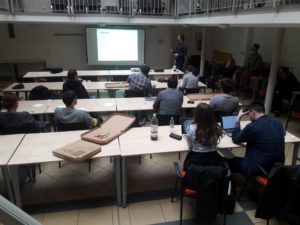 Since one of the main goals of EPS Young Minds project is to connect young scientists among different physics fields, Prague section decided to organize students’ colloquiums named Physics Pizza Party: Students 4 students, where young scientists from different universities and research fields presented their research activities. These events prove to be very successful for three subsequent semesters: winter 2016, summer 2016 and winter 2017.
Since one of the main goals of EPS Young Minds project is to connect young scientists among different physics fields, Prague section decided to organize students’ colloquiums named Physics Pizza Party: Students 4 students, where young scientists from different universities and research fields presented their research activities. These events prove to be very successful for three subsequent semesters: winter 2016, summer 2016 and winter 2017.
This semester we organized totally of four colloquiums. Three talks were from the research fields and one talk from the industry. Research talks presented results about study of the hypernuclei, nanotechnology and quantum walks. These talks were presented by the two PhD students (CTU in Prague and Czech Academy of Sciences) and by the one master student (CTU in Prague). In the order to broad our horizons outside purely academic talks, we invited one speaker from the modern software company. The speaker introduced modern project management methods used in the software development.
Although majority of invited speakers already presented their research activities in front of the experts in their respective fields, almost none of them had any experience with presenting in front of general audience that were not familiar with the topic. Despite of this fact, each talk was perfectly prepared, and therefore there was no problem to understand given topic. Each event was scheduled for about 60 minutes, but with discussion during and after presentation, average time of colloquiums was about 90 minutes and even more. According to the speakers it was very rewarding experience for them.
All four events were advertised in form of posters, which were placed in school buildings. For the purpose of inviting as many participants as possible, we also advertised it on our social sites, namely Facebook and Twitter. Thanks to this advertisement, our students’ colloquiums had large attendance. Average number of participants was around 30 students per one colloquium.
The Prague EPS Young Minds Section found these colloquiums rewarding, since this style of presentation “students for students” is still very rare in our country and we were one of the first who organized this style of colloquiums. According to the feedback from our participants, we concluded that our colloquiums were successful, since they were very positively rated by participants. Thanks to these positive feedback and high number of participants, we would like to continue with this activity – this is what students in Prague expect as well.
Students Meeting at the Start of the Semester
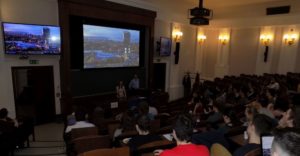 Students Meetings, organised by Prague EPS Young Minds section at the beginning of the semester, are getting more and more popular among students of Czech Technical University in Prague. The third, the last one, was in March 2017.
Students Meetings, organised by Prague EPS Young Minds section at the beginning of the semester, are getting more and more popular among students of Czech Technical University in Prague. The third, the last one, was in March 2017.
After gravitational waves and manned and unmanned flights to Mars we stayed in the topic of Universe, but from a bit different point of view. Now the dean of the Faculty of Nuclear Sciences and Physical Engineering of Czech Technical University in Prague gave the talk about physics of Star Trek – presenting various inventions, similar to science fiction gadget in the movie. This topic was extremely popular and in the future we will probably focus on the events with the topic of the same kind.
Before the lecture, we advertised all of the planned events of our section, as well as the section itself. During the discussions, it was a great opportunity to meet students and talk with them about their opinion on our activities.
Approximately 70 students came and enjoyed coffee and tea before the lecture and then attended the presentation. During the subsequent discussion, they enjoyed refreshments that were partially sponsored by rohlik.cz, czech online food distributor.
The large attendance at the event was mainly thanks to the large number of posters, that were distributed in the universities in Prague. Our event was as well shared in our Facebook sites and than shared by several other sites.
This event was again generally rated as a good idea. There is no doubt, that such an event is a unique opportunity to connect students of different age and from different universities, via an interesting multi-discipline contemporary presentation, that everybody is interested in.
Physics Café
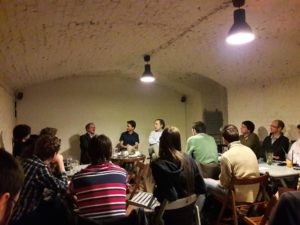 For the first time, Prague EPS Young Minds decided to organise informal events for students to meet with senior academics. Three events in total were held within the Physics Café platform – two open discussions and one pub quiz. All of these were successful beyond expectations, with average attendance of 30 people per an event. The events were advertised in form of posters, which were placed in school buildings. We also advertised it on our social sites, namely Facebook and Twitter.
For the first time, Prague EPS Young Minds decided to organise informal events for students to meet with senior academics. Three events in total were held within the Physics Café platform – two open discussions and one pub quiz. All of these were successful beyond expectations, with average attendance of 30 people per an event. The events were advertised in form of posters, which were placed in school buildings. We also advertised it on our social sites, namely Facebook and Twitter.
The first event was especially challenging for us. Since all the previous Prague EPS Young Minds event were held within the university campus, much effort was put in a search for appropriate café or a similar venue. Once this was covered, our next concern was about the number of people who would attend an event outside the campus. The topic of the first open discussion was “Physics of the 21st Century – What Does It Stand For?” and three scientists took part in it. The event attracted 29 people while about one quarter of the people attending were non-students.
The second Physics Café was organized in the collaboration with the Czech Union of Mathematicians and Physicist. This event was used for the award ceremony and the Union honored their members for their lifetime benefits for the popularization of the physics. It provided great opportunity for informal discussion on the topic “The role of scientist outside of the academic world”.
The last event from the first series of the Physics Café was dedicated to the competition known as Pub Quiz. The questions cover the topic from the world of science, especially they were focused on curious and funny facts from physics. In all cases, the official program was followed by more informal discussions.
In total, three events of the Physics Café were visited approximately by 90 people. This type of event was rated as a good idea and was attractive for students as well as for the senior academics of the Czech Union of Mathematicians and Physicist. Thanks to the positive feedback, there are not doubts, that Physics Café will continue in the future.
